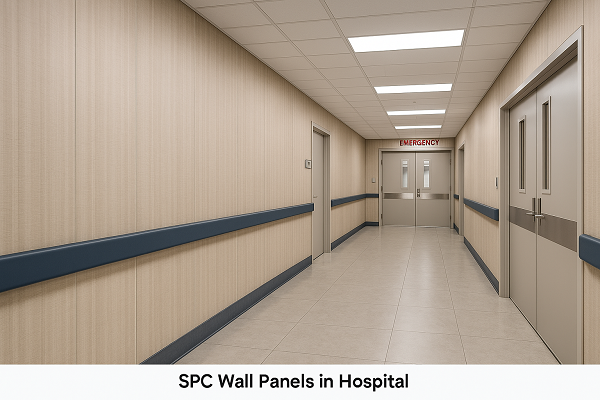SPC Wall Panels are becoming an increasingly popular solution in modern healthcare environments. With hospitals prioritizing hygiene, durability, and efficiency, SPC Wall Panels offer a range of benefits that make them an ideal choice for interior wall finishes.
1. What Are SPC Wall Panels?
- SPC stands for Stone Plastic Composite, a material made by combining limestone and stabilizers for superior rigidity and impact resistance.
- SPC Wall Panels are designed for both residential and commercial interiors, but their specific properties make them especially useful in healthcare facilities like hospitals.
- These panels offer a seamless, low-maintenance, and waterproof surface that meets the high standards of modern hospital design.
2. Hygiene and Infection Control
Hospitals must maintain the highest levels of hygiene.
SPC Wall Panels help in this regard through:
- Non-porous surfaces: Unlike traditional walls, SPC Wall Panels do not absorb moisture or bacteria, reducing the risk of infection.
- Easy cleaning: The smooth surface makes it simple to disinfect using standard hospital-grade cleaning agents.
- Mold and mildew resistance: Ideal for environments where cleanliness and sterility are crucial.
- Antimicrobial coating options: Some SPC Wall Panels come with additional coatings to actively inhibit bacterial growth.
3. Durability and Impact Resistance
Hospital walls are subject to daily wear and tear from equipment, stretchers, and foot traffic.
SPC Wall Panels provide:
- High impact resistance: They can withstand collisions from carts and medical devices without chipping or denting.
- Scratch resistance: Their hard outer layer resists scratching better than painted drywall or tiles.
- Long lifespan: With proper installation, SPC Wall Panels can last for decades with minimal maintenance.
4. Quick and Cost-Effective Installation
Hospitals need efficient construction and renovation timelines to minimize disruptions.
SPC Wall Panels offer:
- Easy installation: Panels can be installed directly over existing surfaces, reducing labor costs and downtime.
- Minimal dust and noise: Installation produces less mess compared to traditional drywall or tile replacement.
- Interlocking system: Many SPC Wall Panels feature a click-lock system for faster, more secure attachment.
5. Fire and Water Resistance
Safety is a critical factor in any hospital environment.
SPC Wall Panels enhance safety through:
- Waterproof design: These panels are completely resistant to water, making them suitable for wet areas like bathrooms, operating rooms, and labs.
- Fire resistance: SPC Wall Panels are engineered with fire-retardant materials that comply with safety codes, reducing the risk of flame spread.
6. Aesthetic Versatility
Hospitals are evolving to become more welcoming and patient-friendly.
SPC Wall Panels support this trend with:
- Wide range of designs: Available in colors and textures that mimic natural wood, stone, or modern patterns.
- Customizable options: Panels can be tailored to match the hospital's design theme and branding.
- Seamless finish: SPC Wall Panels provide a modern, clean look that enhances the overall environment.
7. Sustainability and Environmental Benefits
Modern hospitals aim to reduce their carbon footprint.
SPC Wall Panels align with sustainable building practices:
- Recyclable materials: Many SPC Wall Panels are made with eco-friendly, recyclable materials.
- Low VOC emissions: Contribute to improved indoor air quality for patients and staff.
- Energy efficiency: SPC Wall Panels can offer some insulating properties, helping to regulate interior temperatures.
8. Cost Savings Over Time
While the upfront cost may be slightly higher than conventional wall materials, SPC Wall Panels result in:
- Reduced maintenance costs: No need for repainting, sealing, or frequent repairs.
- Lower replacement frequency: Their durability means fewer replacements over the life of the facility.
- Operational efficiency: Faster installation and fewer disruptions can reduce overall project timelines and costs.


































